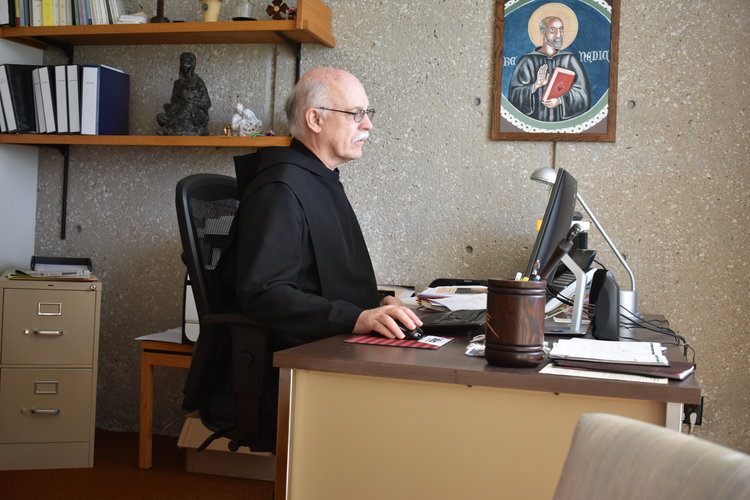Fr. Volker celebrated Holy Mass on Good Shepherd Sunday. A video of his homily is below:
Homily - 3rd Sunday of Easter-2018
Fr. Thomas Hillenbrand gave insight to the readings from Mass this morning. Here is a video of his homily:
The Passion - Good Friday, 2018
The Passion was sung by Fr. Joel Macul, Fr. Thomas Leitner and Bro. Tobias Dammert during the Good Friday services. Enjoy the video below:
Homily - Easter Vigil-2018
Paschal Vigil
Romans 6
Mark 16:1–7
Did you ever want to be there when it all began? Did you ever want to witness that moment when light first shattered darkness? Well tonight we are there. We are at the beginning of this created world that God saw was good. Did you ever want to be present when human beings were created? Well tonight you and I have seen the birth of humanity. We have witnessed our pristine innocence. Tonight we emerge from the dust truly his image and likeness, male and female together. Did you ever wonder what it was like to stand at the moment when a people, a nation was formed? Tonight you and I have been with Abraham, Moses and the prophets as God made and remade his people. Have you ever wondered what it is like to be a slave, oppressed, convicted and have no hope of ever going free? Well tonight the sea has opened and we are a free people. Tonight we have crossed the waters and have passed through safely. Have you ever been a refugee or an exile, living away from home, and wondered if you would ever see home again, if you would ever be connected with all that gave you birth, nourished you and fed you? Well, tonight you and I have heard the good news, and we are on our way back to our own land.
Have you ever been separated from a spouse, a loved one? Have you ever been at a stand off in your relationships an heard the pleading cry, “I still love you”? Well tonight is our wedding night. The one who made us is marrying us. The relationship has endured the test and now it is the time for making love again. Have you ever wondered whether there is a love that is so strong that despite all our wanderings, despite our infidelities, the promise and the commitment is not broken? Well during this night forgiveness was sent into our midst and a bond of peace has been made that can never be broken. All our debts have been canceled and we are as we were on that first day of life, of relationship to God and his son. Tonight we experience unconditional love beyond our imagination.
Tonight we are really at the beginning of creation; we are being born anew. During this night we have become a people bound together by Word and Love; during this night we are touching again the mystery of life in all its fullness. We are proclaiming this life in the face of insurmountable odds. We gathered in the dark, so we thought, but what really kept us together was not the dark night but the light—That attracted. Our first proclamation: The darkness of sin cannot overcome life. Light will win in the end. Light leads us; Christ our Light guides us. The light is not swallowed up by the dark!
As we pass this night together the intensity of this victory over every force of darkness and evil grows and grows. It grows until we hear a young man tell three women: “You seek Jesus of Nazareth, the crucified. He has been raised; he is not here.” You entered the house of death looking for the dead, but the dead is risen–alive. Death has been defeated. Leave your spices here and tell others that life goes before you. That is what you must seek.
Yes , death has been defeated; the death that surfaces every time we feel our bodies freeze and become rigid out of fear; the death that lurks behind every sense of being abandoned, left alone, far from what is familiar. That death dies tonight. It is the death that hides in political and economic systems that leave human beings without the food and drink the prophet says is free; the death that lies hidden in systems that do not call forth the image and likeness of men and women. Tonight is the death of anything that allows us to grow greater and fatter while somewhere among our fellow human beings some are getting weaker and smaller. There is the death tonight of anything in ourselves that says my race, my age, my sex, my nationality, my customs, my status is greater and better than yours. Tonight we are brought back to the beginning and we go forward from here with a new heart, a new spirit and hope.
Our proclamation that Christ is our Light, that Christ is risen, is a proclamation that we have passed over something. And that something is death, it is sin, it is evil, its darkness. This is the Passover of the Lord. He has passed over from the power of evil, into the power of goodness and peace. And the great wonder of it all is that you and I have been called to join the Lord in that passing over. That is what is hidden in the amazement of the women. “He goes before you” so you too can Passover from all that hinders and restricts the covenant of peace and do so without fear or anxiety over who shall roll back the stone, without wondering who can overcome the violence that leaves us hopeless?
Tonight we don’t just stand at the end of something at the end of a story; we are all standing the beginning of something. This night is to bring us back to our origins in the Creator God, in his son and in His life giving breath of the Holy Spirit. We can begin anew. That is the mystery of this night. We start as newborn, as newly created, clinging to the wisdom that will bring us to life eternal.
Do we shake our heads despondently as we look around us at all the evil and negativity in our world? Do we say inside, it is too much to begin? Then hear again the Lord in the prophet Isaias: “My word does not return to me empty. It will succeed in what it was sent to do.” God will win in the end. That is what we are saying today. God has won. The victory is his. And for those of us who are baptized into that victory, we cannot go back. We can only go forward. For Christ can never die again. Sin has no more power over him. All there is tonight is life in all its purity. Let us wash ourselves in it. And let us give thanks to the Father who will never let go of what is his from the beginning.
Christ is risen, alleluia.
He is truly risen, alleluia.
Prior, Fr. Joel Macul
Homily - Good Friday-2018
Fr. Thomas Leitner shared his thoughts during the Good Friday Services. A video of his homily is below:
Homily - Palm Sunday-2018
Fr. Tom Hillenbrand served as the celebrant of the Holy Mass of Palm Sunday this morning. Below is a video of his homily and photo slideshow.

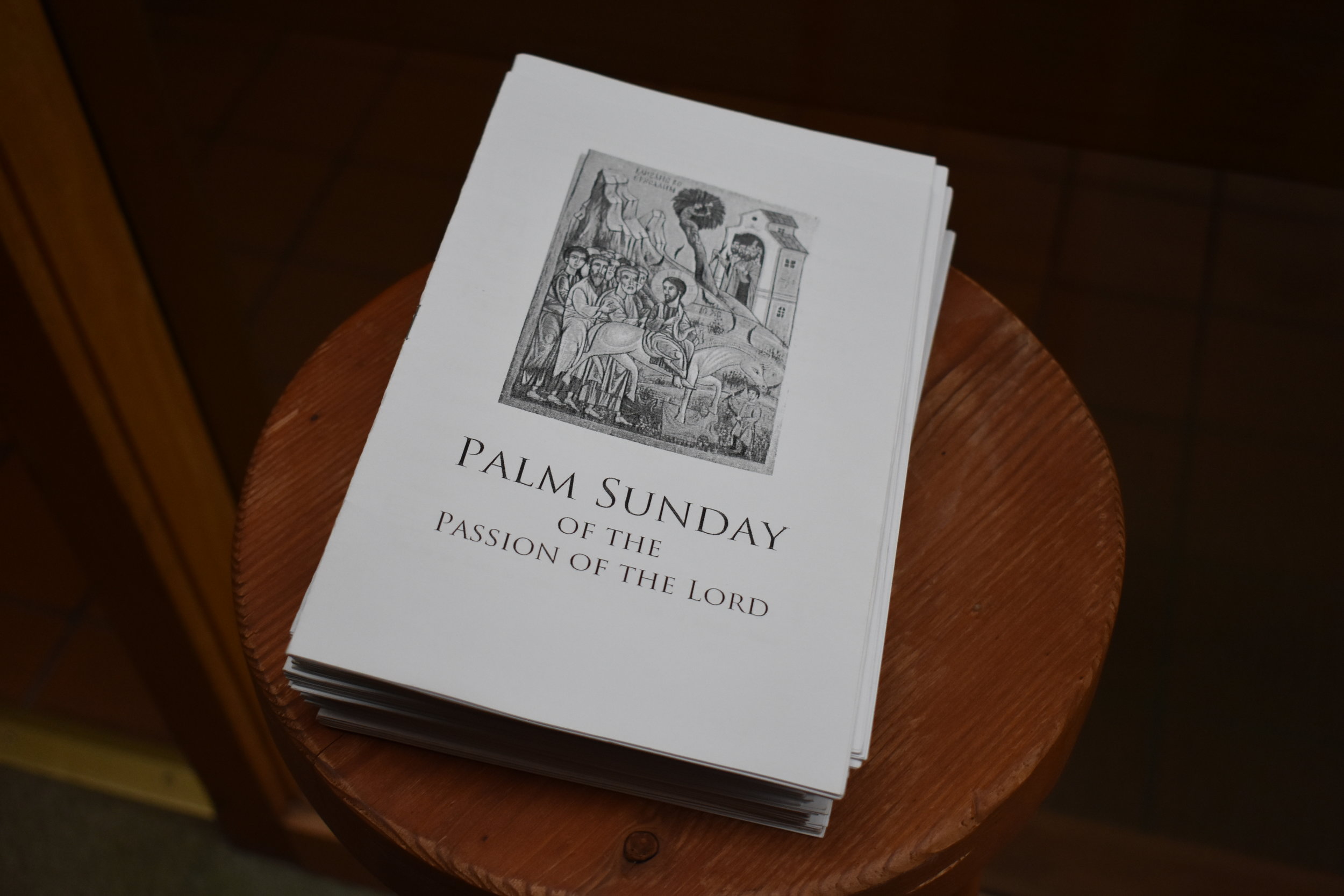
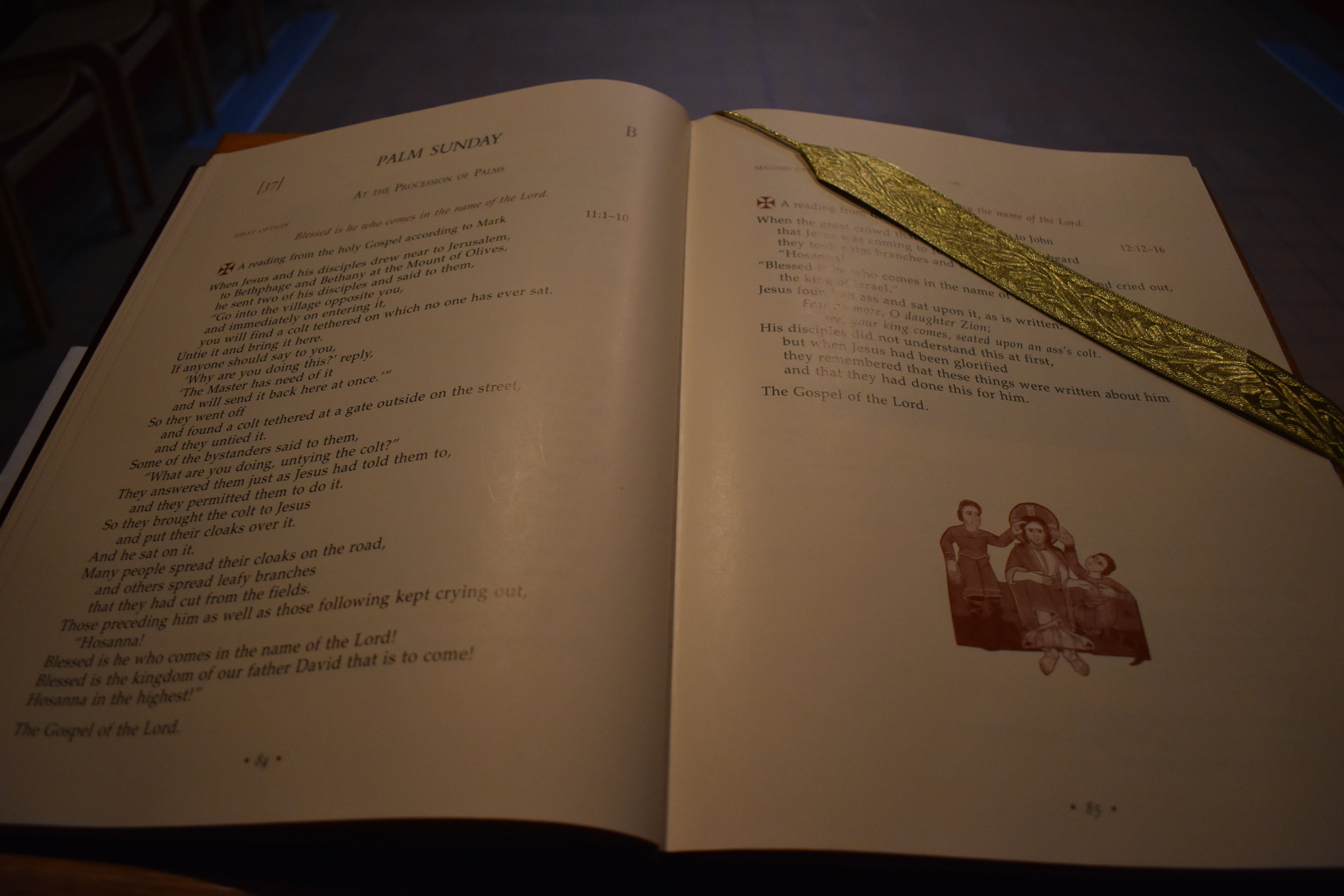

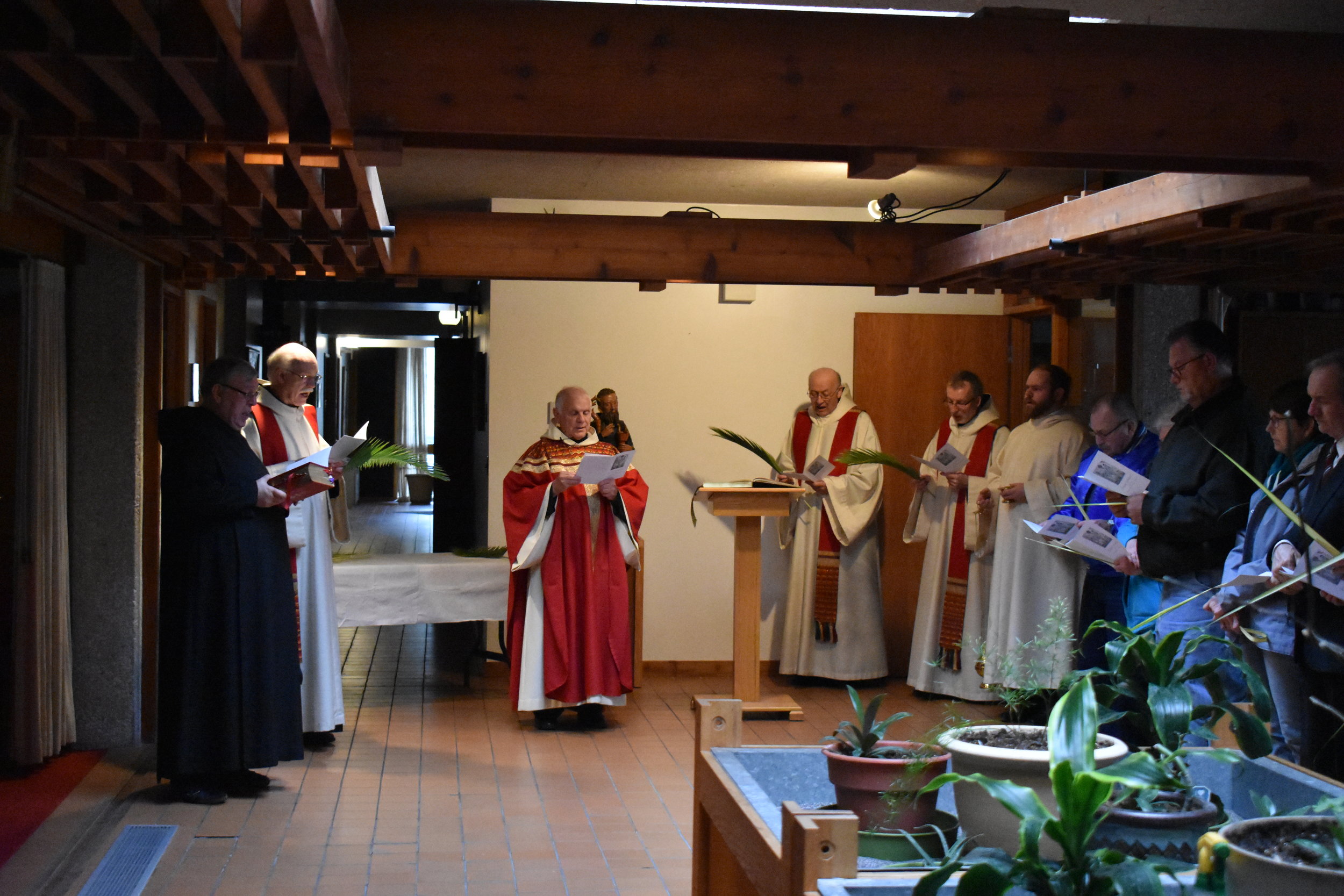
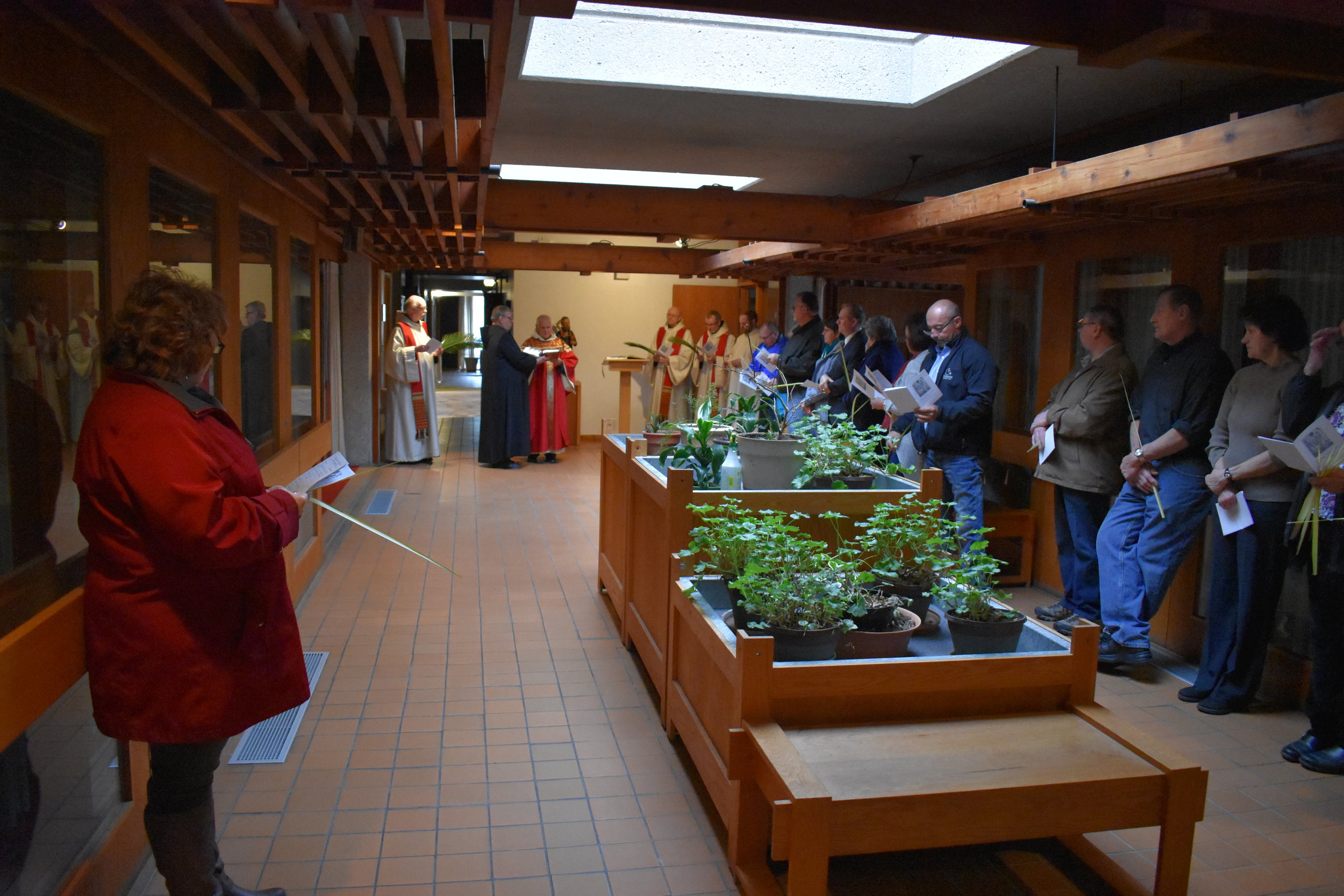

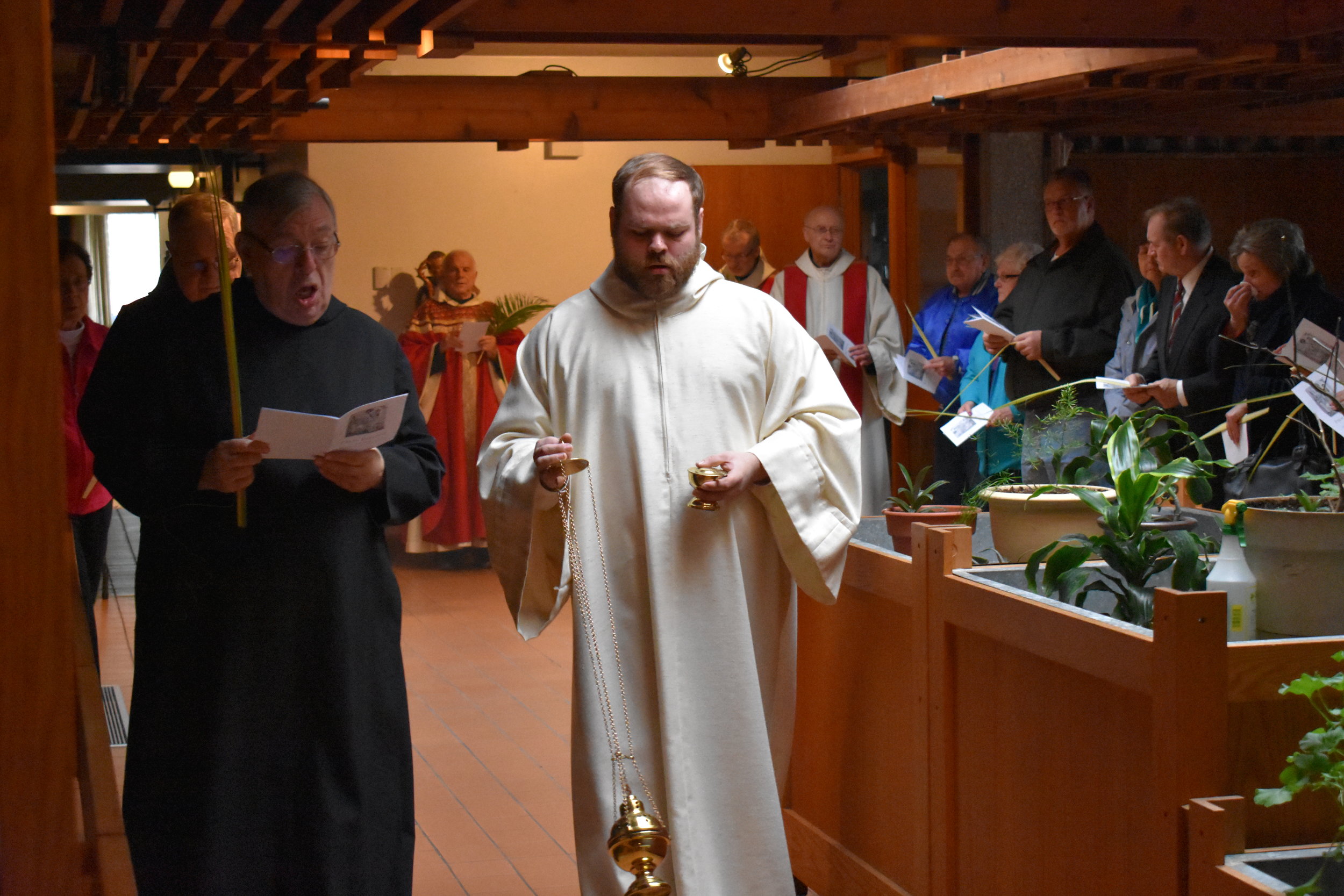
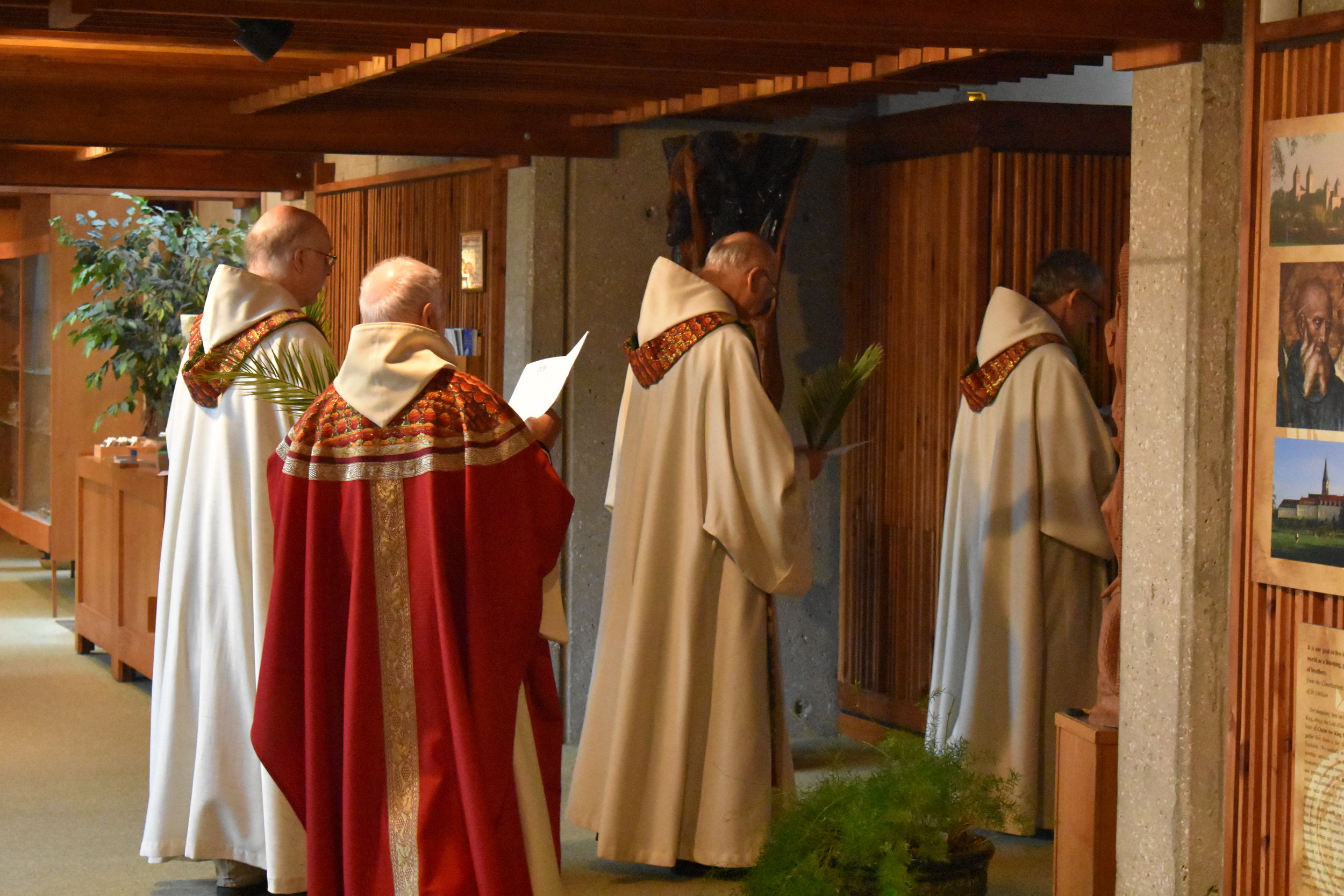
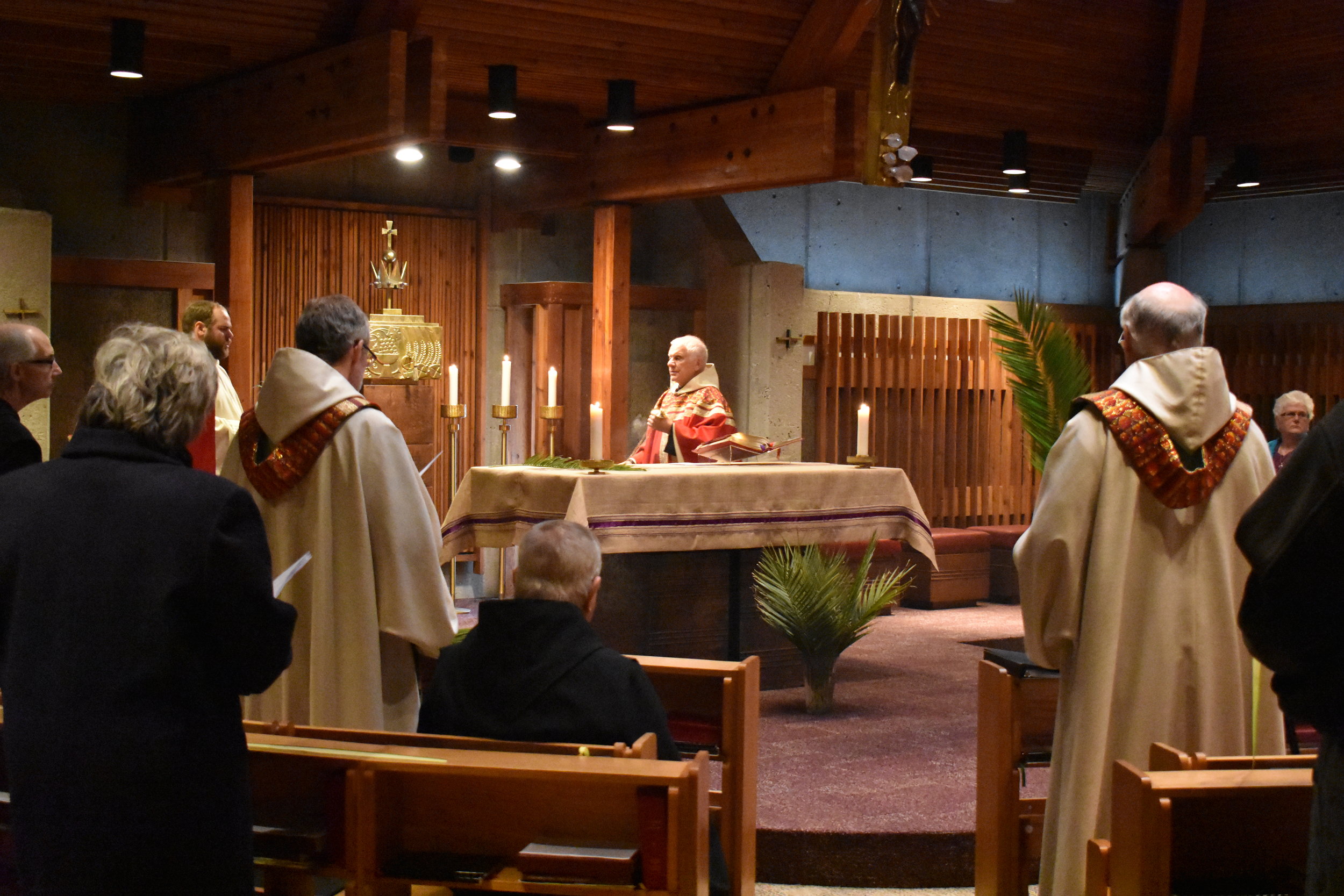

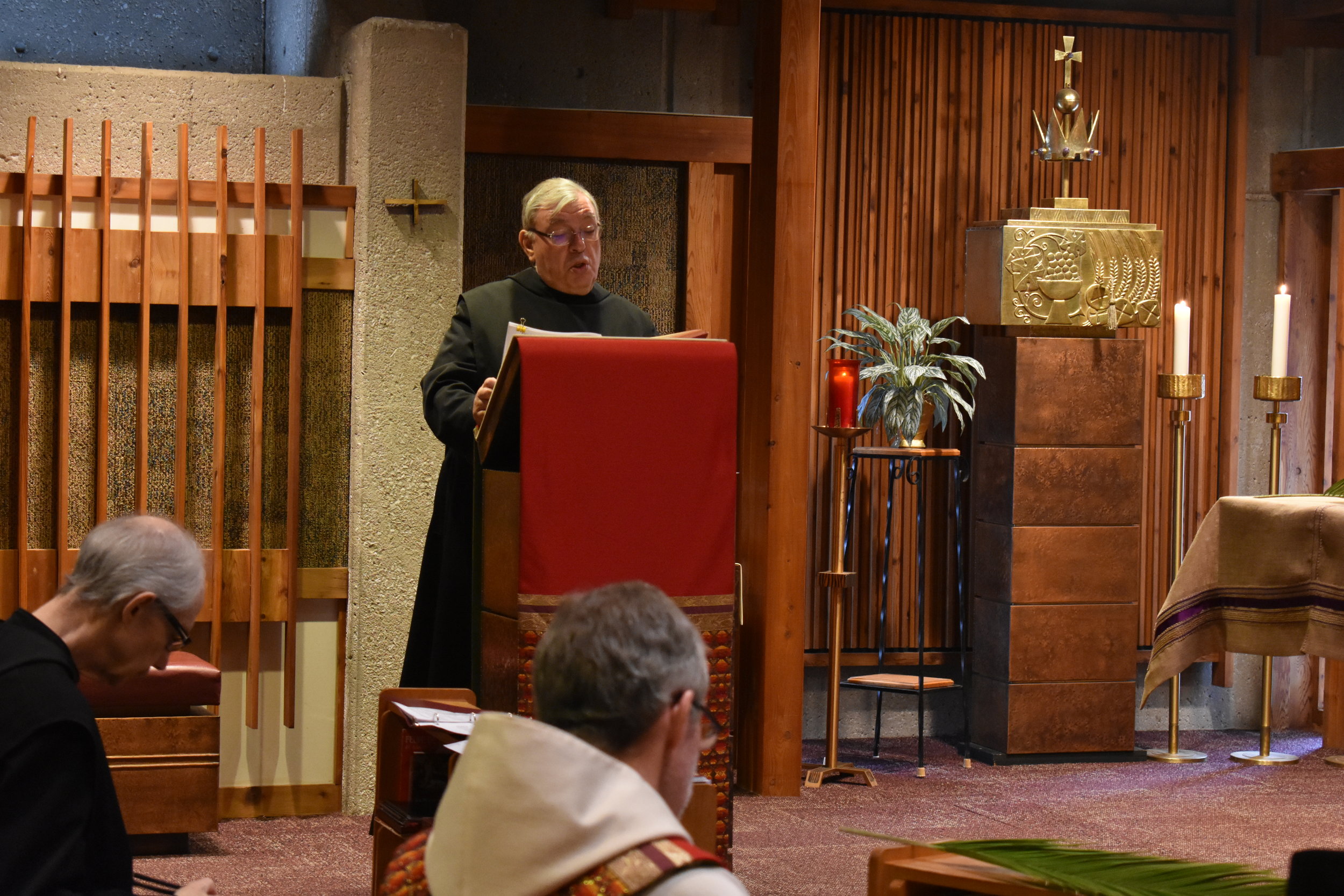
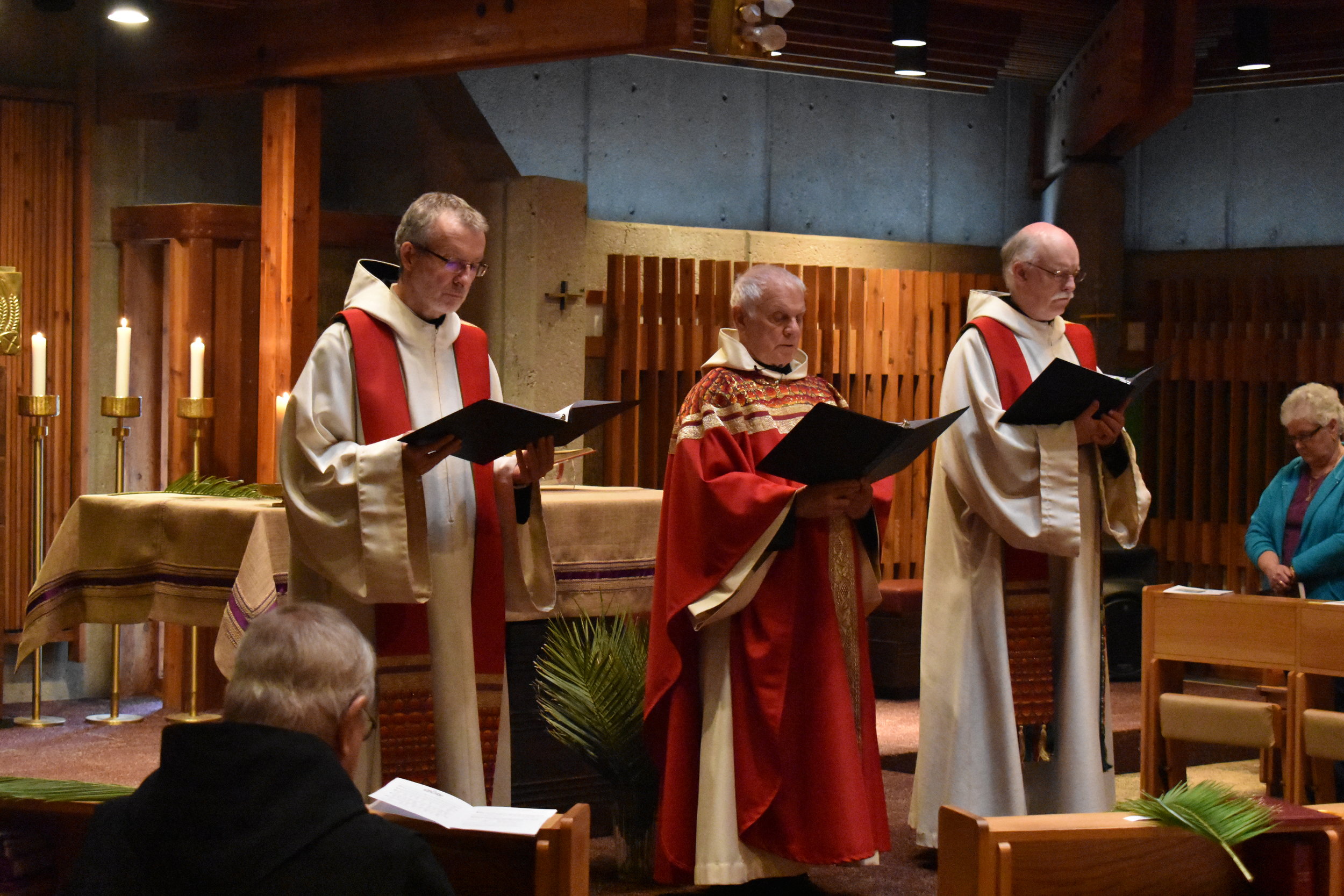
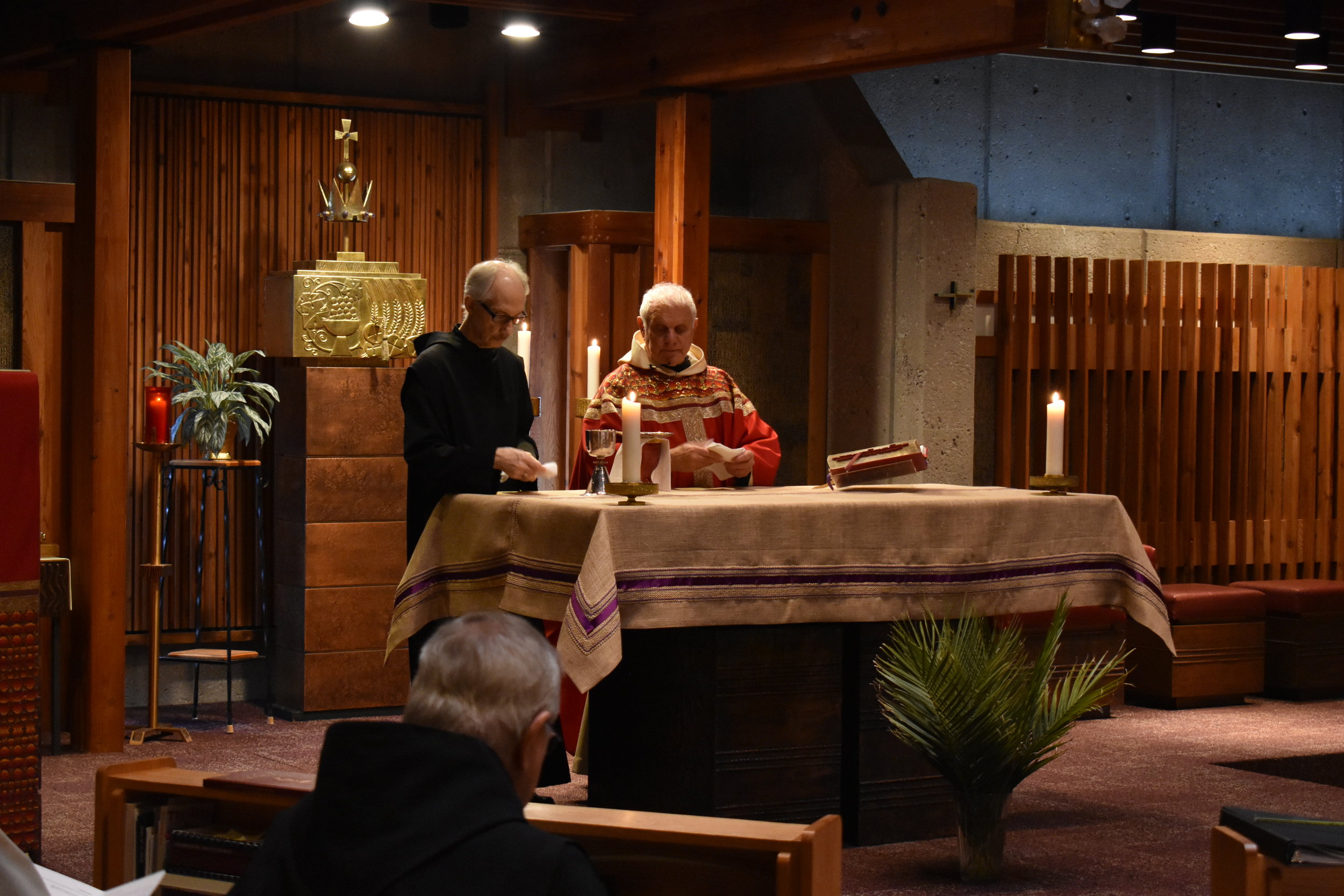
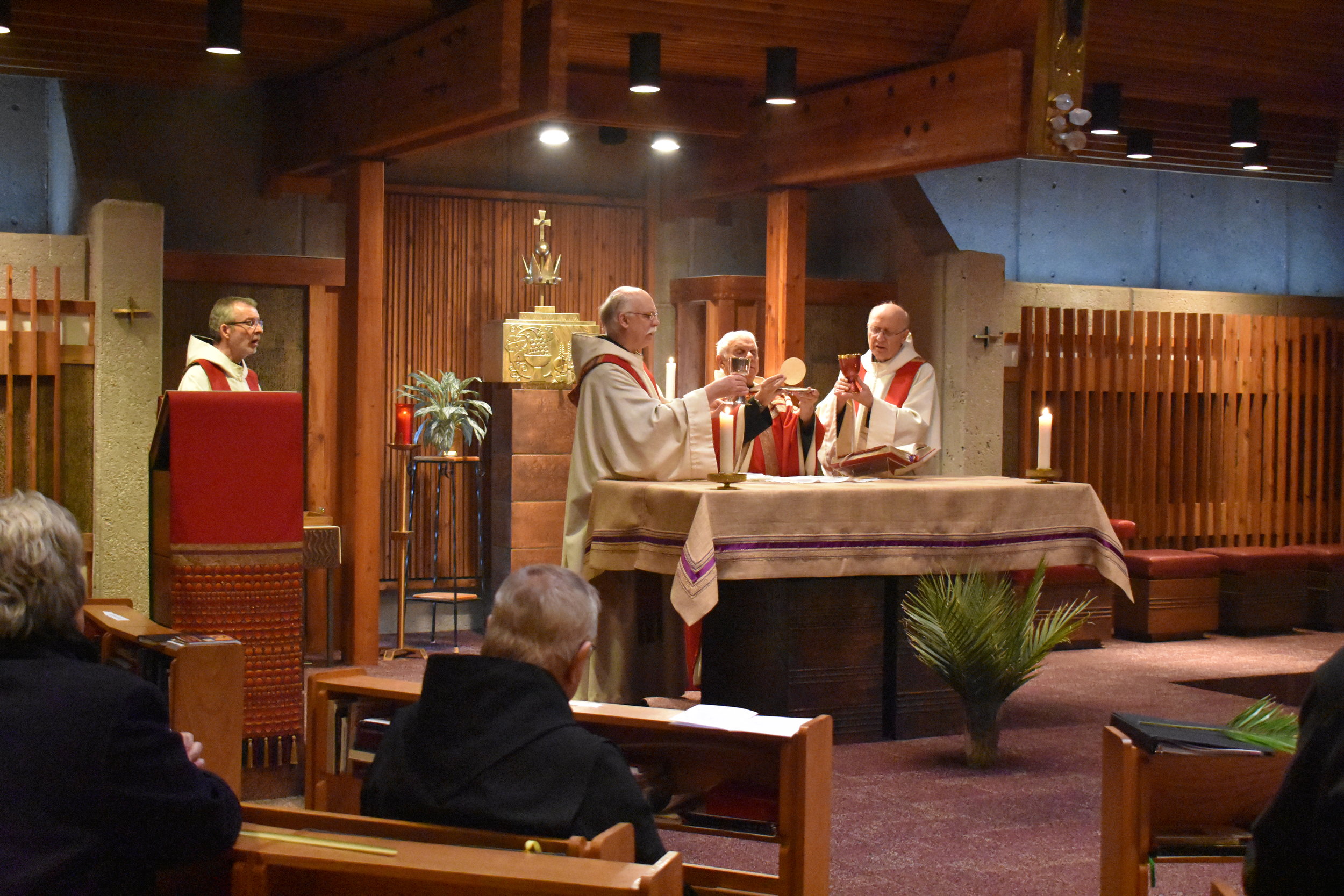
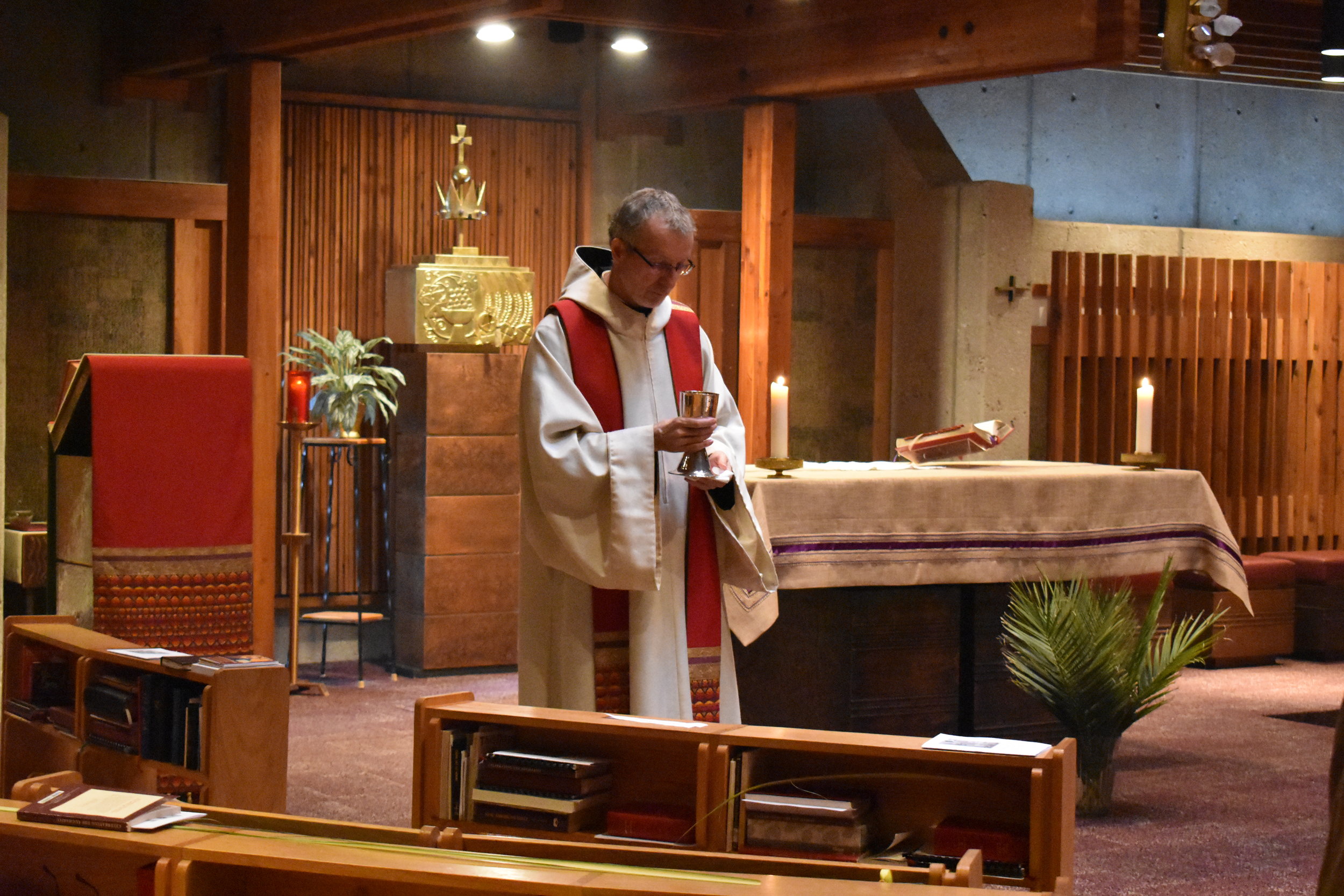
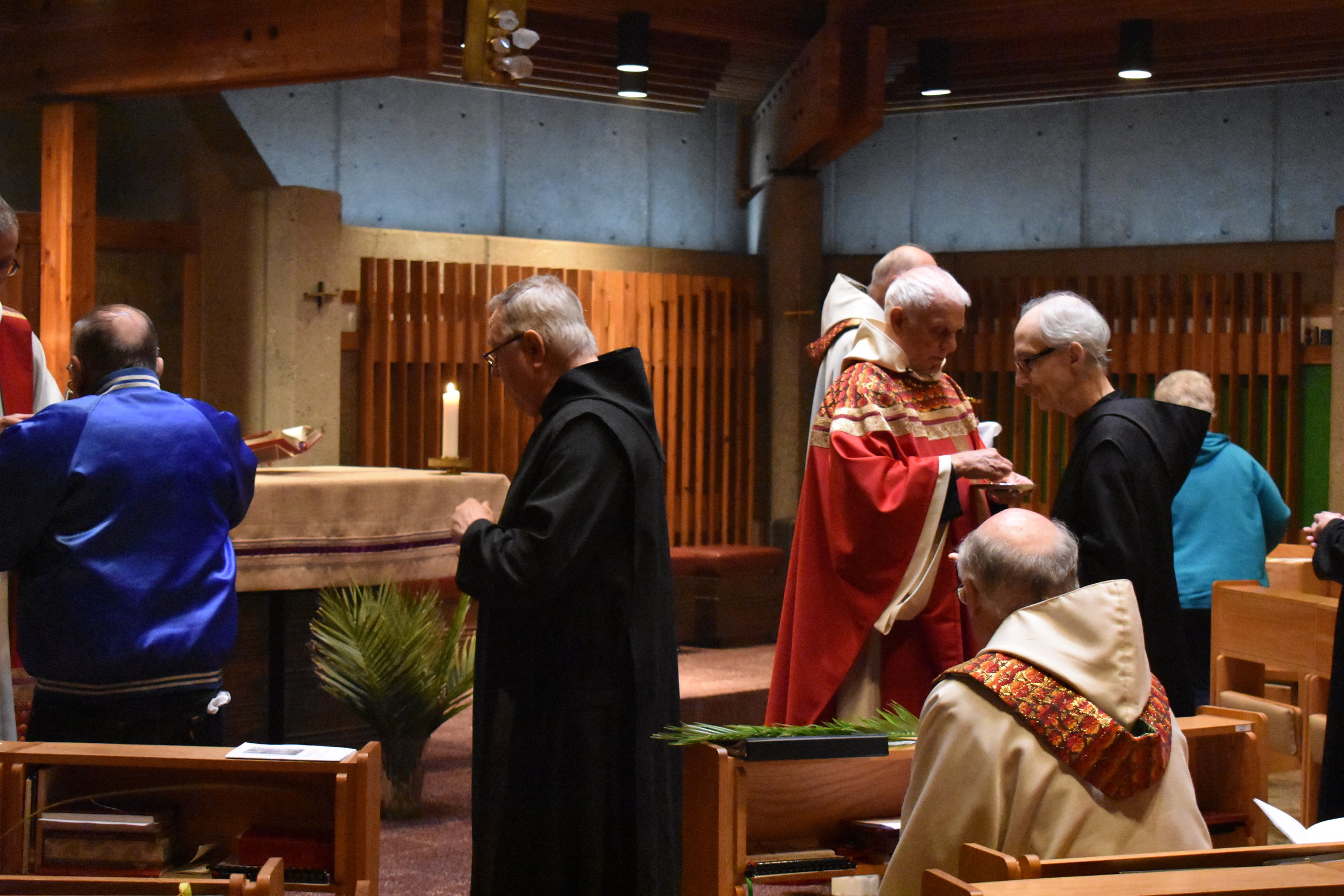
Transitus of Our Holy Father Benedict
Benedictine women and men around the world, and all who follow the Rule of Benedict, give thanks to God for the life of St. Benedict. On this day, March 21st, we observe the Transitus of St. Benedict - his entry into heaven.
The monks of Christ the King Priory extend prayerful good wishes to Oblates, friends, family and our fellow Benedictines.
Homily - 5th Sunday of Lent
"The hour has come, for the Son of Man to be Glorified"
Jeremiah 31:31–34
Hebrews 5:7–9
John 12:20–33
“The hour has come for the Son of Man to be glorified.” We have heard about Jesus’ ‘hour’ from the beginning of John’s gospel. When his mother asked for his help at the wedding in Cana, he reminded her that his ‘hour had not yet come.’ Throughout the Jesus’ story in John, there was a similar refrain. Jesus was not speaking of ‘hour’ in clock time; he meant a decisive moment, a moment of in-break of grace in his life. He was referring to a moment, an event, that would be intimately connected with who he was, why he was here and hence who his Father is. It was not so much a moment he could write into his desk calendar because it would be initiated by his Father. We, too, have had our ‘hours’ when we faced a crisis, when a decision had to be made, when we were about to begin something new; perhaps it would be exciting but we did not know how. Perhaps it was a moment we dreaded. But those ‘hours’ reveal who we really are, where our priorities lie, in whom lies our strength.
Today Jesus announces that his hour has come, the hour that he has been living for. We know that hour as the hour of his suffering and death; to use John’s code word, the hour of ‘being lifted up.’ That is what Jesus says is now beginning. What triggers Jesus’ awareness that his hour has come, that the lifting up, the cross, is at hand? It is the request of some Greeks who want to see him. Jesus announces the ‘hour’ in response to the arrival of outside visitors who want to ‘see’ him. In a mysterious way, Jesus presence and life has stretched beyond Judea and Galilee and reached the world of the foreigner. The Gentile world is seeking Jesus. This movement of those from a distance seeking to see Jesus leads Jesus to announce what must be seen by them. And what must be seen by them is his being ‘lifted up.’ They must see his dying; if they see that and believe, then they will be his servants. Then they can be entrusted with the mission of inviting others to enter into Jesus’ life with the Father.
In the same breath that Jesus announces that his hour has come, he offers us the first image of that hour: a grain of wheat falling into the earth and dying. And in that dying lies the key to producing much fruit. What Jesus wants the Greeks to see is a grain of wheat thrown on the earth to die and only in dying to bear new life. Just as Jesus announces that this image is a way of understanding his hour, so he is saying to those who come to see him, if you want to have a part with me, then dying must become your life.
Jesus uses a Semitic way of expressing it. Jesus talks of “hating” one’s life in the world to “preserve it for eternal life.” It is a way of saying that if you remain loyal to this world’s way of thinking and seeing (remember the Greeks wanted to ‘see’) then you are really choosing an alternative that will bear no fruit; it is a choice of death. But if you chose the dying model, like the grain, then life without end will come. The task for those who take seeing Jesus seriously will mean death in some form or other. Ours is not a culture that wants to look at death, not just physical death but all its other forms as well. But if you have invested your life in Jesus, then there is no other way. Dying covers all aspects of life in this world. There will be a death to self-preoccupation, death to our independence, death to wanting to see things my way and my way only, yes, and death to my so-called autonomy, doing it alone, death to my prejudices. In prophetic language, there has to be a death to my stubbornness and hard heart. That is what Jesus means by hating my life. Where is my loyalty? To myself or to others, to neighbor, to Jesus and the Father? To think that I can find life only in myself is an allusion; in sight terms, it is blindness; it is refusal to see. Those who follow Jesus are choosing to die in the everyday decisions we make to choose him, in being servants to him, to others and to the Father in heaven.
Falling into the ground and dying is not easy. Jesus goes on to acknowledge that his hour troubles him, causes him anxiety. He struggles with it. We hear him ask himself, “What should I say, Father, save me from this hour?” Jesus struggled with dying, with letting go of our human life. He wrestled with the thought of entering this dark world of death, of setting aside a false and illusory self. But he shares with us how he handled it. Very simply, he spoke to his Father about it.
The key to Jesus’ passage through this hour of dying and being lifted on the cross lies in the relationship he has with his Father. Notice that it is to his Father that he brings his question and struggle. The Letter to the Hebrews speaks of ‘loud cries and tears’ in praying to the Father. In the end, he moves to acceptance and says, ‘No, I will not ask to be saved from dying. I came precisely for dying.’ Only in his dying will the Father be truly revealed. Only in Jesus’ being lifted up will the Father and Son be one in loving the world into a new life. Only when Jesus dispossesses himself of any thought of being someone other than his Father’s son, does his dying bear fruit. Only when he lives for his Father and for the world, will his dying be new life for him and for us. The Father loves the world when his only Son loves the Father through dying.
Jesus says what will happen when he is lifted up, when he dies on the cross, when he loves us to the end, till ‘it is finished.’ He will be drawing everyone to himself. Others will see how God works in the faithful obedience of the Son; everyone will see in the Son lifted up, the place where God and the world come together. The Son of Man lifted up will become the center of the human world, the unifying point of humanity.
We who understand ourselves as servants of Jesus, of what are we servants? We are servants of his dying. We are servants of a transformation process that allows us to shed, like the grain in the ground, the hardness of our hearts, so that God can write his covenant of peace on our human hearts and so bind us to himself forever. On the cross, Jesus became that new covenant that Jeremiah sees today. On the cross, the Father glorifies Jesus as his Son, on the cross the Father recognizes his Son. And from the cross, embracing and carrying all our inhumanity, Jesus brings his obedience and love to the Father as his faithful Son.
We are servants of that mystery each time a little more of ourselves dies and falls away; we are servants of Jesus when like him we remain bound to the same Father that glorified his Son. When we remain faithful to that kind of dying, then we too will bear much fruit.
-Prior, Fr. Joel Macul, OSB
Easter Triduum 2018
THE EASTER TRIDUUM 2018
all Liturgical Celebrations at Saint Benedict Center
Thursday, March 29 HOLY THURSDAY
6:30 AM Office of Readings $
Morning Prayer
12:00 Noon Daytime Prayer
7:00 PM MASS OF THE LORD’S
SUPPER
Adoration until Midnight
Friday, March 30 GOOD FRIDAY
6:30 AM Office of Readings &
Morning Prayer
12:00 Noon Daytime Prayer
3:00 PM GOOD FRIDAY LITURGY
7:00 PM Compline
Saturday, March 31 HOLY SATURDAY
6:30 AM Office of Readings &
Morning Prayer
12:00 Noon Daytime Prayer
5:30 PM Evening Prayer (Vespers)
7:15 PM Night Prayer (Compline)
Sunday, April 1 EASTER SUNDAY
5:00 AM THE EASTER VIGIL at SBC
Breakfast following – all are invited
From Daytime Prayer on: all at BMH
12:00 Noon Daytime Prayer
5:00 PM Solemn Vespers
7:00 PM Compline
CHRIST IS RISEN, ALLELUIA
Homily - 4th Sunday of Lent
Fr. Volker celebrated Holy Mass for the 4th Sunday of Lent. His homily video is below:
Homily - 3rd Sunday of Lent
Joh 2:13-25 Ex 20:1-17 1 Cor 1:22-25
Focus: God’s Ten Commandments continue to be valid for us.
Jesus, a stumbling block or foolishness to those who reject Him however, is the ultimate measure of our living.
Dear sisters and brothers in the Lord,
It took me a while to understand how today’s Lectionary readings fit together. There are, one the one hand, the Ten Commandments from the book of Exodus. They are at the center of God’s covenant with God’s people on Mt. Sinai. The one who acted first was God.
The people of Israel had experienced their liberation from slavery in Egypt as a gift from God. Without military equipment, they wouldn’t have been able to withstand the chariots and charioteers, the horses, soldiers and weapons of the Egyptians.
So after the crossing of the Red Sea they gratefully acknowledged, what we hear from the mouth of God in today’s first reading, that it was God who brought them out of the land of Egypt. The faithfulness and love of God, whom the people owe their very existence, is the one side of the covenant.
The Law, related through Moses, describes then the expectations of God and the obligations of the people. Right at the beginning and at its peak point we find the Ten Commandments. The first three deal with the people’s relationship with God.
Do not elevate anything created to the status of Divinity, so we hear, neither things nor human beings.
Hold the name of God in reverence, # 2 says. Israel views it as a privilege to address by name the great, transcendent God, who is beyond all earthly images. It needs to be done with respect.
One safeguard against idolatry is the observance of the Sabbath. Six days of the week can be devoted to our business in the world; one day a week—for us it is the Sunday—must be reserved for God, for prayer and worship, for listening to God’s Word, for praise, intercession and thanksgiving.
The other seven commandments are about our relationships with our fellow human beings, basic principles for living in human community. One example is # 4: We have not brought about our own physical life—It’s a gift from God though our earthly parents; thus, we are called to always respect them and care for them.
Also for us Christians, these Ten Words, the Decalogue, are still binding. In fact, through the Catechism they are the foundation of Catholic ethical instruction. Jesus didn’t come to abolish the law, rather to fulfill it.
Some of the commandments Jesus interpreted in a more radical and interior way: “You have heard that it was said to the people of old, ‘You shall not kill’ … But I say to you that everyone who is angry with his brother shall be liable to judgment” (Mt 5:21-22). The movements of the human heart also matter!
Jesus pointed out that there is one double commandment that stands as a heading and as a summary over the others:
to love God with all one’s heart, with one’s whole person
(not only externally performing rituals) and to love and honor one’s neighbor as one’s own life.
This brings us today’s gospel: Jesus dislikes the focus on externals in temple worship; and the exploitation of the poor by the temple elite. In John’s Gospel, over and above that, the cleansing of the Temple is a witness to the person of Jesus:
Zeal for God will consume him, he will suffer and die on the cross. But after three days He, the Risen Lord, will become the new place of God’s dwelling. The temple in Jerusalem with its animal sacrifices will lose its importance. Jesus himself is the new sacrifice. To him we should look now for revelation, for redemption, and for guidance.
Dear sisters and brothers in the Lord, God’s Ten Commandments continue to be valid for us. They hold a mirror in front of us so that we can look at our life the way it is, in its basic goodness, but also its sinfulness and need for conversion.
Jesus himself, however, is the ultimate measure of our living, he who is a stumbling block or foolishness to those who reject him, but who IS God’s power and God’s wisdom for those who believe in him.
In him we see God’s “foolishness” in reaching out to straying humanity. In him we see God’s weakness as God gave himself into human hands at the cross.
But we can trust and confess with St. Paul that God’s foolishness is wiser than human wisdom and that God’s weakness is stronger than human strength. AMEN.
Fr. Thomas Leitner, OSB
Homily - 2nd Sunday of Lent
Discover what "binds" us to Jesus. The video of Fr. Joel's homily gives us insight into the story of Abraham and Isaac.
Second Sunday of Lent
Genesis 22:1–2, 9a, 10–13, 15–18
Romans 8:31b–34
Mark 9:2–10
The Abraham story we have just heard is one of the most troubling texts of all Scriptures, Old and New. In the Jewish tradition it is known as “The Binding of Isaac.” Having received the boy Isaac as his long-hoped-for son and heir, Abraham now receives instructions to make a whole burnt offering of him on a mountain God will point out to him. God is asking Abraham to take the one he loves and slaughter him. We ask ourselves is this the kind of God we have that demands obedience in such a harsh and cruel way? Is this the way God is? Who wants this kind of God? Why should God ask such a thing of a man to whom he has promised he will be a blessing for the nations.
In the struggle to find meaning in this story, neither the Jewish community nor the Christian one abandon the story. It remains. Our version today is a shortened one, but the story will come back to us at the Easter Vigil, of all places, in full length. That it appears today and at the Easter vigil already speaks to us of how to find its meaning. The rabbis in Jesus time had already worked with it. In their view Isaac is a willing victim for death. He joins his father Abraham in obeying God’s request. Isaac is a hero, a martyr. So today in the Jewish community, the story is a metaphor for all their suffering and persecution down the centuries. They have placed their hopes in God’s hands despite the seeming absence of God during their times of trial, during the holocausts the community has endured.
We hear echoes of the theme today in St. Paul when he says: “He who did not spare his own Son but handed him over for us all, how will he not also give us everything else along with him?” Paul understands the Father to have let Jesus enter into the human world of death; he did not hold him back from this human experience. And the Father does this out of love for us. His Son joins us in death and the Father then stretches out his hand and raises his own Son out of death into life. Jesus is obedient to the Father’s desire to love us back to life and the Father in turn is obedient to his Son by being faithful to him.
Today’s Liturgy of the Word has two icons as it were. The one is the Binding of Isaac and the other is the transfiguration of Jesus. These are two powerful images and our eyes cannot help but pass back and forth from one to the other. They seem so different, so opposite from one another. But they share something in common. Both stories are about a father and son. And both stories are about the love of father and son. The poignancy of Abraham’s story is that he is being asked to let go of “his only son, the one whom he loves.” And on the mountain where Jesus stands, he hears a voice that identifies him as “This is my beloved son, listen to him.” Two fathers, two sons and both sons are headed for death and both fathers will not spare them from death, from a life robbed from them.
We might think that Jesus transfiguration is all about glory and divinity. But the story is surrounded by Jesus’ impending death. Just before this he has told his disciples that he must go to Jerusalem and be killed. He says that if they truly are his disciples, they too must take up a cross. On coming down from the mountain, Jesus tells Peter, James and John not speak of the vision with its transfiguration and brightness and voice from above until after he has been raised from death. Death comes up again on the way down from the mountain. There is no understanding the brightness and glory without death. And Moses and Elijah are conversing with Jesus. About what? About the journey that lies before him. In this journey he will complete and fulfill what the Torah and the prophets are all about. He will seal a new covenant in his blood.
What is behind the obedience of Abraham? Why does Abraham say yes to what is asked of him? Abraham surrenders the most precious thing God has given him, his son. This is his hope, this is his future. Yet he is willing in the face of what looks like an extreme absurdity to hand this back to the one who gave it to him. He is willing to engage in trust in the God who makes promises. When what looks like life and the future is taken from him, all he has is the word, the promise of the God who speaks such a word of promise.
In Jesus, God has his Son bound up by our inhumanity: betrayal, violence and condemned to death. In his Son, God himself shares in our binding. And then the Son entrusts himself into the hands of the Father. He lets the Father’s will work. And his will does work in the midst of our sin and death and it raises Jesus, as St. Paul’s says, to his right hand. God keeps his word. That is the heart of the mystery of Christ, the mystery on Mt. Tabor, the mystery the Father invites us to today: Listen to him.
Abraham’s story of obedience might and should shock us. Obedience reaches to the heart of self, it asks for self-surrender. Jesus’ obedience to the Father needs to shock us as well. He remained faithful to the Father walking into the power of death. All he had was the words: “You are my beloved son.”
And what about all the bindings in our lives, the bindings that have caused us anguish and questions over the last decades up to now: the Holocaust, nuclear destruction, racism that never seems to let go, the mistrust in institutions, gun violence. We struggle with all these and the deeply personal bindings as well, and there seems to be no answer. We can lose faith. Or like Abraham and Jesus, we can climb the mountain of Moriah and Calvary, and carrying the wood of our cross, we can join Jesus in trusting in the Father to the end. Then when having done that in faith, hope and love, we will know that the surrender of self opens up to the glory on the mountain of transfiguration.
Prior Fr. Joel Macul, OSB
Homily - 1st Sunday of Lent
Fr. Tom Hillenbrand celebrated Holy Mass this Sunday morning. Here is a video of his homily:
Homily - Ash Wednesday
Our own Fr. Volker was the celebrant for Holy Mass this morning. The Lenten season officially began for the monks and visitors of Christ the King Priory on this Ash Wednesday. Listen to Fr Volker's homily here:
Prior's Message
In St. Benedict’s chapter on Lent in the Rule, he uses the word ‘joy’ in conjunction with this season. This may seem a bit unusual to most of us. We associate Lent with more sober, serious language in line with what is the accepted penitential character of this season. Benedict understands our Lenten offering as done ‘with the joy of the Holy Spirit.’ The personal Lenten discipline each of us undertakes is already the result of the Spirit. The Easter gift of the Spirit is prompting us to shape up our lives. It is Easter, the goal of Lent, that actually shapes our behavior these forty days. Lent clearly is related to its goal, Easter. Lent is not a goal unto itself but a season when we try to open up to the Paschal Mystery. Lent is meant to train us in the language and spirit of Easter.
Benedict actually sees Lent as a focus on our desire for Easter, a longing for this feast characterized by joy. Lent is our time to hone our desires. Our Lenten practices are meant to make us aware of our true desire and to shape and discipline our ways accordingly. What are we longing for? Things of the Spirit? Then waiting for the feast of life in the Spirit at Easter can be a waiting in joy to celebrate once again God’s breaking into our hearts and world on the feast of feasts and breathing his Spirit upon us to make all things new.
Prior Joel Macul, OSB
Homily - 6th Sunday Ordinary Time
Pianos, Violins and today's Gospel. Listen to Fr. Volker's homily here:
Homily - 5th Sunday Ordinary Time
Our own Fr. Thomas Leitner celebrated Holy Mass this morning, at the Benedictine Mission House chapel. Below is a video of his homily. Printed copy follows.
Mk 1:29-39 Job 7:1-4.6-7 1 Cor 9:16-19.22-23
focus: We cannot answer the question why humans have to suffer. Jesus does not answer it, either. But he shows us God’s loving solidarity with those who suffer.
function: It is our call to follow his example.
Dear sisters and brothers in the Lord,
Once upon a time, in a faraway land, there lived an upright and blameless man called Job. He had a loving wife, seven sons and three daughters, and the largest estate in the kingdom. He didn’t abuse the power and privilege he enjoyed. He used his wealth for hospitality and his influence for helping the needy. No one who went to Job’s house for help left disappointed.
However, Job’s piety and sanity are put to the test. In a series of disasters he loses his family, his friends, his fortune, and his possessions. Messengers keep coming to him to tell him tales of horror, of loss and of tragedy. Finally, Job is afflicted with sores from the soles of his feet to the crown of his head. Job exclaims, “The Lord gave and the Lord has taken away; blessed be the name of the Lord.” The only thing that Job doesn’t lose is his faith in God.
That Job is depressed, however, we hear in today’s reading: “Is not man’s life on earth a drudgery? … My days are swifter then a weaver’s shuttle; they come to an end without hope.”
Why does Job have to suffer? Why should an innocent person face such a fate?
In Old Testament Times it was thought that suffering was directly connected with people’s conduct, and that anyone who suffered had sinned. Job’s friends, who come to console him, represent this view. However, Job cannot believe that he is personally responsible for all these terrible losses because of his own wrongdoing. Job has become the image of the innocent person’s suffering. None of us is sinless; but many have to go through suffering that is not caused (at least not in full measure) by their own sin.
In the end, God speaks to Job; and Job experiences God’s consoling presence. It must have been a deep experience of God. God doesn’t explain, however, why all this has happened. - There simply are things that are very difficult to understand for humans. Why do I have to endure so much loss and suffering, some of us, too, may ask, while other people seem to be spared of it?
In today’s gospel, Jesus is surrounded by a large number of suffering people. How does he respond? He is present. He approaches Simon’s mother in law and takes her by the hand. He brings healing to the sick and the afflicted. He faces the demons and commands them to leave.
Early in the morning, he goes off to a deserted place. There he communes with God, his heavenly Abba. Prayer replenishes his strength to care for the suffering. Prayer helps him also with decision-making. In this case, he realizes that he needs to go to the nearby villages in order to preach there also.
Jesus’ communion with God in prayer makes it possible that he is so totally transparent for God’s love, that God’s love becomes so visible and tangible in him. We, too, are meant to become transparent for God’s love more and more. Jesus’ “person is nothing but love,” Pope Francis wrote, “a love given gratuitously… The signs he works, especially in favor of sinners, the poor, the marginalized, the sick and the suffering are all meant to teach [us] mercy.”
Dear sisters and brothers in the Lord, We cannot answer the question why humans have to suffer. Jesus does not answer it, either. But he shows us God’s loving solidarity that those who suffer can count on. That’s why he has come. It is our call to follow his example.
Do we also set times aside, like Jesus, for personal or communal prayer, during which we open ourselves to the love of God and receive strength and inner clarity for the any activities of our day? Do we intentionally plan such times?
We can face suffering with the love of God. If we ourselves are going through a hard time, we can imagine that Jesus is present to us today in this Eucharist and is healing us, as he touches us in the Eucharistic bread and wine and becomes one with us.
And we can ask ourselves: Who are the suffering or grieving people in our families, and among the folks around us? Is today’s gospel calling us to be present to one or more of them, to listen to them, perhaps to grieve and to weep with them, and to assist them?
We can become instruments of God’s compassion and solidarity for others, we can become God’s compassion in flesh, God’s care in motion, and enduring witnesses of a God who cares. As it was with Job, so it is sometimes with us. God doesn’t seem to answer our why questions. – However God, revealed to us in Jesus, and through us to others, always can heal the brokenhearted.
Fr. Thomas Leitner, OSB
Homily - 4th Sunday, Ordinary TIme
Fr. Tom Hillenbrand celebrated the Holy Mass this morning. Watch the video of his homily. A text copy is also printed below.
JESUS VS THE DEVIL
Is the devil for real? You better believe it!
One night at Blue Cloud Abbey, I was in my office reading. I got a phone call from a young man in Revillo, a little town close by the Abbey that we served from the monastery. It all started out normal enough.
He started to tell me that he was involved in a diabolical cult and he was scared and did not know how to get out of it. The cult told him to burn his Bible and hang his crucifix upside down, which he did.
Then as he was talking to me, in an instant, his voice changed completely into a very deep and gravelly voice that I could hardly understand. Just like the voice of the devil in the movie “The Exorcist.”
I hung up immediately but I was pretty shaken up by that experience. Believe me, the devil is real.
Even tho the devil is real, he is very seldom that dramatic or obvious. He is generally more subtle in our lives, but he is there nevertheless.
In the missalette “Give us this Day” Rachel Linner writes of her little demon “resentment.” She says: “I confessed the sin in the Sac. Of Reconciliation and prayed for the person whenever I found myself remembering the litany of wrongs he had done to me. And why was I reciting the litany anyway, which only nestled the unclean spirit deeper in my heart.” And don’t we all do this with those we resent? Recite a litany of wrongs about those people we are at odds with.
Rachel goes on to say: “The more I asked Jesus to remove the stubborn sin and it handmaidens (pride, self-pity, righteousness, envy) the more barriers I put in Jesus’ way. I know my unclean spirits and they know me.
I harden my heart because if Jesus expels the unclean spirits, I will be empty”. Here Rachel was referring to the psalm response we had today: “If today you hear his voice, harden not your hearts.”
Then she goes on to say: “Maybe I will spend years in purgatory before I am cleansed. But I want my unclean spirits expelled long before I die, so that I can be free to do Jesus’ work in the world. If only I don’t harden my heart.”
Probably the one over-riding demon we all have to deal with is the same one that Rachel had to deal with. Relationships. Relationships with others that have gone sour, or worse, that have crashed and burned.
All of us, at some time or another, have people we just can’t forgive. We can’t seem to get them out of our mind. The main problem is that no matter how hard we try, we can’t, by our own effort, forgive them. We are carrying way too much pain and hurt, too much emotional baggage, too much anger.
Even Jesus could not forgive all those who scourged, slapped, spit on him and than nailed him to a cross. He was in way too much pain to forgive. So what did he do? He turned them all over to His Father and said; “Father, you forgive them, they know not what they are doing.”
And that’s what we have to say as well to let Jesus drive the demons of hate, anger, and resentment out of our hearts. When that person pops into our head we need to say immediately: “Father, forgive him, forgive her, they know not what they are doing.” And then move on, and go about our business. Live in the present moment, live in the now.
Our problem when we start getting down, getting upset or depressed or angry, is that we are thinking way too much, and praying way too little. Stop thinking, and start praying. Put that person at the foot of the cross and move on. Don’t look back, don’t think back.
Martin Luther King was one of the most forgiving persons of all. He preached and practiced non-violence, and turning the other cheek. He said it so well: “Darkness cannot drive out darkness, only light can do that. Hate cannot drive out hate, only love can do that.”
Paul says in the 2nd reading: “Brothers and Sisters, I would like you to be free of anxieties.” And he also says: “Try, as far as possible, to live in peace with everyone.”
So how can we all be free of anxieties? How do we let Jesus drive out the little demons in our heart? We need to do 3 things.
Pray more, think less. Instead of thinking thru-out the day which we all do way too much, we need to start praying little prayers thru-out the day. Little “Thank You’s” thru-out the day, as one man told me after Mass one day. He said: “I try to say little “thank you’s” everyday, thru-out my day.”
Pray “Father forgive them, they know not what they do,” for any person we can’t forgive. Then let them go and move on and focus on what you are doing.
Live in love. Love alone can drive out hate, drive out the darkness in our life.
Fr. Tom Hillenbrand, OSB
Homily - 3rd Sunday in Ordinary Time
Jonah 3: 1-5, 10
1 Corinthians 7:29-31
Mark 1:14-20
Paul doesn’t mince words today, does he? “Time is running out.” The time that is running out is a little more than the shopping days before Christmas that we went through just a month ago; it is a little more than getting that check written for a payment that is due. For Paul something bigger is at stake. It is more than the pressure of everyday living. Paul is trying to wake up the Corinthian community to the fact that a radical change is on the horizon. For him and the community it was the coming of Christ. Paul may have been off about when the Lord will return. But what remains valid is the feeling of urgency that such talk engenders. Time is running out and this world as we know it is passing away. Such language should make us think twice even today. Paul is right in the end. With the coming of Jesus, the world changes; things cannot be the same as they used to be. Paul is calling on the Corinthian community to realize that faith in Jesus Christ is not in addition to their daily lives; it affects everything about their daily lives, the choices they make, their joys and sorrows, their business plans, even their purchases.
This sense of urgency, the feeling that something new is on the horizon and demands a response from us, is found in all the texts of God’s word today. It is quite vivid in the story of the prophet Jonah, the reluctant prophet. We can easily get sidetracked by Jonah and the big fish. The big fish God sent was precisely to prevent him from escaping the urgency of the moment and his role in it. He was to go to Nineveh and call the city to repentance. God gives them a time limit of 40 days; 40 days or else you’ll be no more. After only preaching for one day, the whole city responds to the call and begins their fasting and mourning. The point being that the pagans or the non-Israelite Ninevites recognized God’s prophet and his message when he told them that “your time is running out.” They took the message to heart and acted on it even before Jonah finished his rounds of preaching in the city. The city, one and all, responded to the moment of God’s call and changed their ways. The surprising thing about the story is that the Ninevites were enemies of Jonah and Israel and yet they grasped the meaning of the moment. It would almost seem that it doesn’t matter who God sends with the message. The meaning lies in whether we recognize that this is God’s moment and respond accordingly.
Today we hear the first words of Jesus in the Gospel of Mark (Last Sunday we heard the first words of Jesus in John’s Gospel: What are you looking for?). Like Jonah and Paul, Jesus’ words are about time: “This is the time of fulfillment. The Kingdom of God is at hand. Repent and believe the Gospel.” These are his first words and they certainly should make us sit up and ask who is this and what is happening here? It is helpful to keep in mind that Jesus is talking about a special time here. He is not just talking about the next thing coming up in the schedule. Jonah, Paula and Jesus are referring to the moment of great and decisive events. It is known as a kairos moment, a time when things come together; it is a time when God breaks into our scheduled time and opens up new possibilities; it is a time when life takes on new meaning; it is what happens when we experience something that will clearly change our lives. It can be a death, it can be a birth, it can be falling in love, and it can be making a promise. These are kairos moments. That is what Jonah announces to the Ninevites; Paul says scheduled time is running out because a new moment is here.
Today Jesus breaks into the ordinary world and business of Galilee with a new time, a kairos time and event: the Kingdom of God is here. Such an event and promise call for a response. Jesus tells us what that response looks like: repent and believe in the good news. It sounds simple. Repent here is not so much concerned only with sin and bad behavior. The word means “to change your mind” or better “change the way you see things” The root meaning of the word metanoia “change the eye of your heart.” Look at things differently. Look at yourself and the world in a new way. And for Jesus that way of looking at things is through the lens of the Kingdom of God. Change your view of the world and see it through God’s eyes. God is doing something new here, he is breaking into the world with his dream, his vision for what he intended from the beginning. What is needed on our part is a change of heart, or a change of vision.
The response of the first disciples is an example of the metanoia. What is clear in the call of Jesus is that these men entered a new world with Jesus. They followed him, the gospel says. This following of Jesus would forever change their lives. The skill and expertise of fishing would now have as its point of reference the Kingdom of God.
Our baptism plunged us literally into this new time. We changed sides as it were: we went from the passing world to the new world of the Kingdom. But it is a slow process for us. We have a continuing need to go through the same process of abandoning what we think to be the only perspective (leaving the nets and their entanglements and their catch) for the work of fishing for hearts. For most of us, we will probably spend a lot of energy stepping out of the small things that entrap us and confine us. These fishermen from Galilee left behind a rather good living—for what? For a relationship with Jesus and for a Kingdom that was of God. Jesus saw them and in that seeing they were caught. And when they left to follow him, they would see the bigger picture of God’s Kingdom.
The urgency felt in such phrases as “40 more days, and it is the end of you,” “time is running out” and “the time is fulfilled” is still there today. We know very well what urgently needs to be touched by the Kingdom of God. For one thing there are the many social issues that stand before us today; each need the good news of the kingdom: they range from the essential truth that all life is a gift of the God of the kingdom from conception through death, the recognition of the refugee and migrant, the acknowledgment of the evil of racism that divides and discriminates the children of God, the disunity among us Christians, the pollution of earth, our common home. Which of these does not urgently need to be overtaken by the good news that the Kingdom of God is at hand, that Kingdom that can transform all this into a God-blessed and God-loved existence?
The urgency of Jesus’ first words still bears on us today. The Kingdom of God is still ‘at hand.’ It is not finished. We can still join the disciples and get out of our boats and join Jesus in learning to make this Kingdom a true home for all with whom we live and for the earth that sustains our every step. We all need to leave behind one point of reference and find another in the footsteps of Christ, whose footsteps alone can lead us into the way of peace, the way to God’s Kingdom.
Fr. Joel Macul, OSB
Homily - 2nd Sunday in Ordinary Time
Our own Fr. Volker Futter was the presider at Holy Mass this morning. Watch a video of his homily below:








